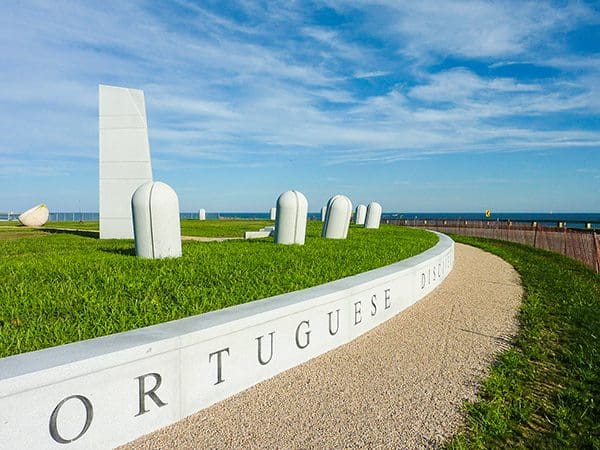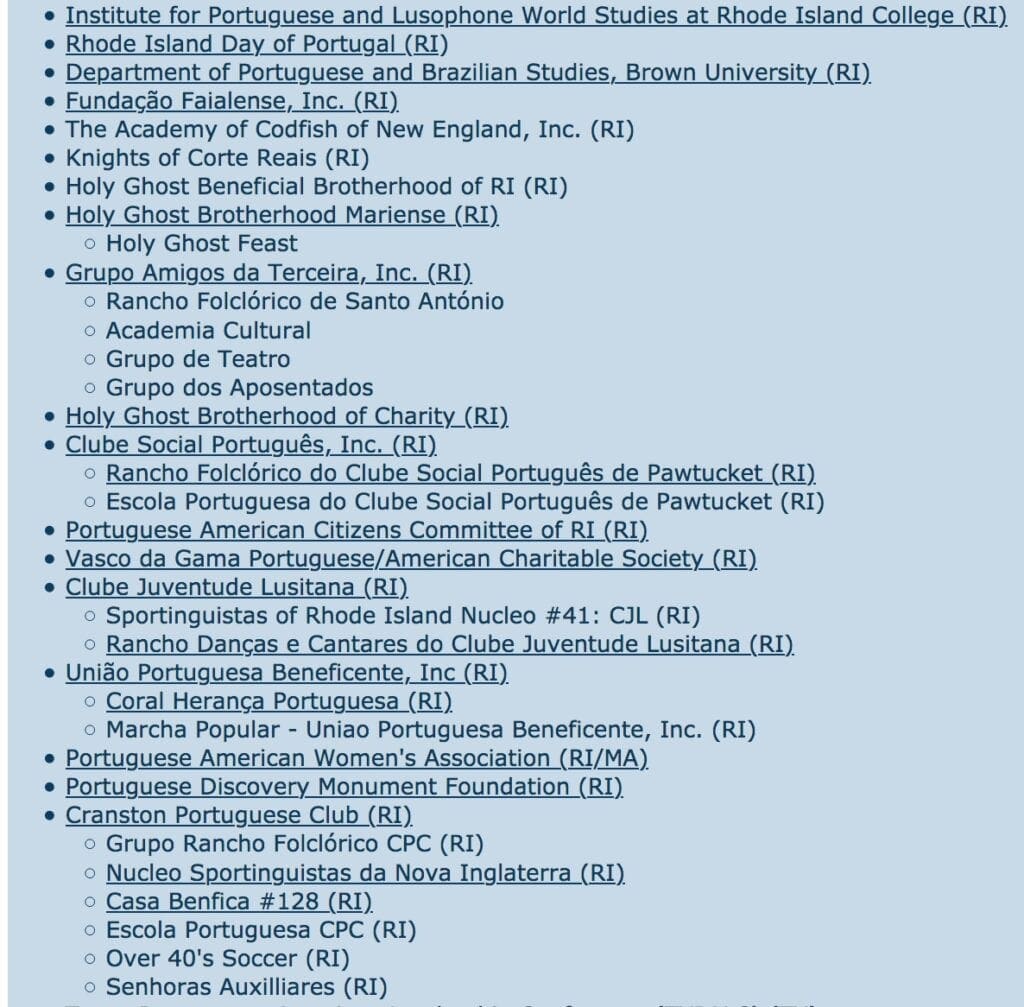Search Posts
Recent Posts
- Rhode Island Weather for June 4, 2025 – Jack Donnelly June 4, 2025
- Sour Grapes time! – Tim Jones (meet Tim at AnimeCon) June 4, 2025
- Lawsuit filed to stop Empire Wind Project by 4 environmental groups and fishermen June 4, 2025
- It is what it is: 6.4.25 – Jen Brien June 4, 2025
- New ALS treatment by PathMaker Neurosystems. Co. funded by RI Life Sciences Hub to come to RI. June 3, 2025
Categories
Subscribe!
Thanks for subscribing! Please check your email for further instructions.

The RI Portuguese community stands up
Several weeks ago, a bill was submitted by RI Rep. Anastasia Williams that would exclude “Portuguese” as a category in the Minority Business Enterprise (MBE) program.
The intent of the bill was to have more business go to African-American owned businesses. After the bill was submitted, PALCUS – the Portuguese-American Leadership Council of the United States became aware of it and informed their membership. They provided emails and mailing addresses of the entire Rhode Island legislature and requested members write to them to better inform them about the minority designation of Portuguese business owners, the rich history in Rhode Island, and to respectfully request this bill not be considered.
At present, the bill is before the House Labor Committee, which is also chaired by Rep. Anastasia Williams. The bill has no co-sponsors at this time.
After our second story on this bill, O Jornal picked up the story, and obtained a quote by Rep. Williams, as well as others. Link, here:

Reprinted, here:
State Representative Anastasia P. Williams has introduced legislation in the Rhode Island General Assembly to prevent Portuguese-owned companies from being considered minority-owned businesses because she says this designation gives them an unfair advantage in a state affirmative action program for public projects.
If passed, Williams’ bill, the ’2020 – H 8123: An Act Relating to Public Property and Works – Minority Business Enterprise,′ would delete Portuguese (a person of Portuguese, Brazilian, or other Portuguese culture or origin, regardless of race) from those eligible to be considered as minorities for purposes of awarding public works projects.
“The MBE [Minority Business Enterprise] program is based on equalizing discriminatory practices against racial minorities and women… In the 1980s, then Senator John Correia, of East Providence, who was Portuguese, a majority leader and had influence…. took the liberty of putting in legislation to identify Portuguese as a racial minority when in fact they are not,” said Rep. Williams, a democratic legislator who represents District 9 in Providence and serves as chairwoman of the House Committee on Labor.
Williams said Portuguese people identify themselves as “white” and “European,” and therefore are not a minority racial group. She maintains the participation of Portuguese-owned firms has skewed the percentages of minority participation on state and local government-funded projects.
“I have absolutely nothing against the Portuguese community. It’s not about bringing harm or disrespect to the Portuguese community,” Rep. Williams told O Jornal. “It’s just about putting the playing field where it is supposed to be. It’s about presenting what the law really is. Someone took the liberty of changing it for a particular group of people, and it was wrong. It’s trying to right the wrong that was done. That’s all.”
The loss of the minority status would exempt Portuguese-owned businesses from special bidding for work on certain public projects and it would take effect upon passage of the act.
Other groups defined in the bill, which would retain minority status are: Black, Hispanic, Asian American, American Indian and Alaskan Native, and other groups or other individuals found to be economically and socially disadvantages by the Small Business Act.
State Representative Joe Serodio, a Democrat who represents District 64, says he vehemently opposes this bill.
“Now is not the time to erect further barriers to prosperity by pitting our strong and diverse communities against each other,” he said in a prepared statement. “Portuguese Rhode Islanders, particularly those in East Providence, share a rich and deep history with Rhode Island. We are immigrants who came to this state to provide for our families and build upon the American Dream. We share the same stories, similar struggles, and the same close-knit but small population that every other minority community in our state possesses. We have experienced discrimination, lack of opportunities, and unfair characterizations of our culture and people.”
Rep. Serodio argues that Portuguese Rhode Islanders are indeed a minority community because they make up just 9.7 percent of the population.
“The MBE list is supposed to lift our minority-owned businesses to success and equality, and it is for this reason that I am strongly opposed to removing Portuguese Rhode Island businesses from the MBE list,” said the Portuguese-born legislator, who came as a child to East Providence, where he later founded his own small business, America Travel.
According to the website of the R.I. Office of Diversity, Equity and Opportunity, “Under Rhode Island General Law 37-14.1, Minority business enterprises are targeted for participation in all procurement and construction projects and shall be awarded a minimum of ten percent (10%) of all dollar value of the procurement or project.”
Currently, there are 728 companies listed as Minority Business Enterprises on that website. Of those 57, identify themselves as Portuguese-owned, and some of those owners also identify themselves as being a woman or Black. Most of them are construction contractors.
David Silva, president of Silva Advertising Specialties, Inc. of East Providence, said that if the bill passes, it would definitely have a negative impact on his business.
“It will be big,” said Silva, estimating that between 10 and 20 percent of his business comes from public contracts. “I do promotional items for them – pens, shirts, mugs, and other promotional products.”
Meanwhile, the Portuguese American Leadership Council of the United States (PALCUS) is lobbying against the bill and has been reaching out to every member of the R.I. House of Representatives about this situation. The organization will also be reaching out to all Portuguese clubs and organizations in Rhode Island to make sure they are aware of the issue.

“In our view, this is a blatantly discriminatory action against the Portuguese people of Rhode Island,” reads a statement issued by PALCUS. “At 9.7% of the population, the Portuguese are clearly a minority, can be of any race, and are part of the immigrant population of the state.”
Rhode Island is not the first state to attempt to prevent Portuguese-owned companies from being considered minority-owned businesses.
In 2018, a Boston Superior Court ruled that all firms previously certified as Minority Business Enterprises (MBEs), based on the owner being of Portuguese origin, could no longer be considered as such.
The lawsuit had been filed two years prior by a business owner who sued the state of Massachusetts after being passed up for projects that were awarded to Portuguese-owned businesses.
Due to that ruling, Victor Fernandes, owner and co-founder of Fernandes Masonry in New Bedford, said his business lost a lot of contracts.
“That hurt us big time, especially the first two years,” he said. “We lost a lot of revenue and about 20 percent of our labor force. It had a huge impact… now, there is a lot of work and it’s not affecting us as much. But the first two years, it was brutal.”
It’s all about education
For those who think the Portuguese now identify themselves as “white” and “European,” and therefore are not a minority racial group, Nancy Thomas, founder of RINewsToday and an affiliated member of PALCUS says, “we encourage Rep. Williams to learn about Portuguese history. And our history in Rhode Island. There’s been so much activity this year surrounding the Census 2020 project and our proper identification. While we are ‘organized’ we are somewhat quiet in touting our ethnicity and rich heritage in the state – as this is a time when celebrating all minority groups is encouraged, we look forward to increasing these efforts – and further educating all our neighbors in business and otherwise.”
PALCUS has many affiliated groups and these groups are in Rhode Island:

If you would like to contact the groups about events and membership, this link will provide you with more information:
https://www.palcus.org/mpc-affiliated-organizations
Mission of PALCUS
“The mission of the Portuguese-American Leadership Council of the United States is to be the national voice that advocates for and promotes the advancement of the Portuguese-American community economically, professionally, culturally and politically.”
Rhode Island Captains
Most states in the US have a series of Captains. These are the Captains in Rhode Island:

Nearly 80 businesses identify as “Gateway” organizations in the PALCUS Directory – if your business is Portuguese owned or servicing, you can list them here:
https://www.palcus.org/gateway
Rhode Island has a rich Portuguese culture – this is a continuing series in getting to know the Portuguese in our community.
Brenton Point State Park, Newport

Situated within Brenton Point State Park on the southern tip of Aquidneck Island with expansive views of the Atlantic Ocean, this monument on Ocean Drive is dedicated to Portuguese maritime navigators. Brenton Point was a strategic military defensive location during the Revolutionary War and World War II. The State of Rhode Island designated the area a State Park in 1976. In 1988 a site was set aside for a monument, a concept advanced by the Portuguese Cultural Foundation and the Portuguese Federation. Funded jointly by the State of Rhode Island and the Portuguese government, the Point was selected as it is reminiscent of Sagres in southern Portugal, the location of Henry the Navigator’s nautical school founded in 1419. Designed by Charters de Almeida and carved in Portugal, sixteen sandstone bollards ranging in height from five to eight feet were organized into a semicircle mimicking the historic pebble compass rose at Sagres Point. In the center, an eight-foot-diameter sandstone sphere representing a Portuguese navigational instrument and a twenty-foot-tall obelisk inscribed with names of explorers were erected.

